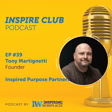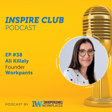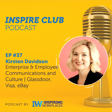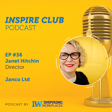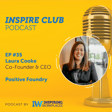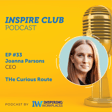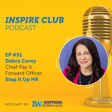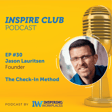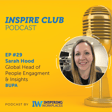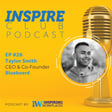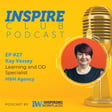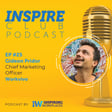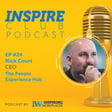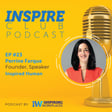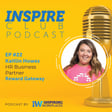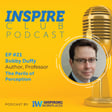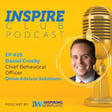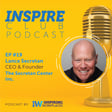Become a Creator today!Start creating today - Share your story with the world!
Start for free
00:00:00
00:00:01

Inspire Club EP #28 - David Bellamy
In this episode we talk with David Bellamy, Founder & CEO at Harkn.
With over 25 years of experience in management consulting, leadership advice, and strategy, David have a deep understanding of the human aspects of work and the challenges that leaders face in creating a positive and inclusive environment.
His company, Harkn, helps companies hear more of what matters about life inside their business by making it safer and easier for employees to share their experiences, ideas and opinions. They have developed market-leading capabilities around identifying and supporting those people who are showing signs of distress at work.
We hope you enjoy it.
Recommended
Transcript
Introduction of Host and Guest
00:00:01
Speaker
Hello, and welcome to the latest episode of the Inspired Club podcast. I'm our host, Matt Maners, CEO and founder of Inspiring Workplaces Group. And we're going to get stuck into it straight away today.
David Bellamy's Role and Background
00:00:13
Speaker
Today's guest is David Bellamy, founder and CEO of Harkin, a revolutionary platform transforming how companies listen to and engage with their employees.
00:00:21
Speaker
Over 25 years in management consulting and leadership strategy, David champions the untapped potential of employee voice as a cast list for organisational culture and performance. Beyond the corporate world, David serves as a director and trustee for the Chum Project, a community-based charity focused on improving the wellbeing of vulnerable individuals. And outside of all that, a thoroughly good chat, as they say. So welcome to the podcast, David. How are you doing? I'm all right. Thank you, Matt. Yeah, thanks for having me on.
00:00:51
Speaker
Great intro music. Thank you very much. I did not compose it. And I'm really grateful for that. God knows what it would sound like if I actually did try to compose any bit of music. When I was school, they gave me the triangle that gives you the kind of level. I was given the xylophone.
00:01:11
Speaker
Well, that's one up from the triangle, so I'm jealous.
Influence of David's Father
00:01:15
Speaker
So, Mozart, we ate. I'm really looking forward to hearing about your experiences at work and people have inspired you along the way. So, as the people that regularly listen to the podcast, we do have one rule of Inspire Club, and that is to share a story of somebody who's inspired you along the way and why. So, over to you, David. Who's inspired you along the way and why? Yeah, thank you.
00:01:43
Speaker
Well, as you alluded to in the intro there, I've been fortunate enough to work with lots and lots of people over the years and lots of great individuals too. But I'm going to be, this is probably quite a trite response and I hope it doesn't come across that way. But I've got to say that I'm going to have to lean to my father. You know, that's, you know, somebody who,
00:02:11
Speaker
you know, came out of a shoe shop, took a filing clerk job in a life insurance company many years ago, and ended up being one of the founders of St. James's Place. And he was CEO there for a long time. And the thing I think that always
00:02:29
Speaker
I carry with me, if you like, is he was always company first. I mean, I don't mean head of family. I mean, he'd be perfectly capable of holding duality of purpose in life, you know, which is, you know, family first and company first, but never self. And I think that, you know, he's very hardwired into doing the right thing, even when the right thing is not very easy.
00:02:57
Speaker
So that's, I think, you know, I could regale countless stories, but I won't because they're his stories. Where, yeah, just somebody I could look to and, you know, when you look for those moments of what's the right course of action.
00:03:14
Speaker
I think it was the sort of true North type stuff, isn't it? I think just always very clear and comfortable finding that position. What's the right thing to do? And then let's do that. So that I think, so that's a, let's say, I bet lots of your guests say something like that, but I think for me, that's it. So somebody's did it the hard way, but always the right way. And what was, what is your father's name?
00:03:42
Speaker
He's also David Bellamy, so it's nice and easy. For all the things he was, he wasn't very imaginative when it came to naming kids.
00:03:50
Speaker
Fantastic. Well, the other, the David Bellamy senior, thank you for inspiring the junior version. So, I agree with, I understand your sentiments, you know, I saw a statement the other day, the character is what you do when nobody else is looking, and the right thing, and that hit home, you know, always trying to prove oneself, and it sounds like you had a great example.
Leadership and Organizational Culture
00:04:14
Speaker
Just listening to the story, would servant leadership describe your dad well? Like, you know, just work to give for others in that sense. Like you say, you have many examples. I'd love to hear an example. I think, you know, I think there's... I don't imagine you would have been a terrifically easy guy to work for. Because I think, you know, leadership is about situation and context, isn't it? Yeah.
00:04:43
Speaker
But so I think, you know, he would hold lots of the strings. But I think, you know, in terms of, you know, when you look at trying to build an organisational culture where actually performance is key and meritocracy is held dear, so you get on regardless, you know, there should be nothing holding you back. I think those sorts of things.
00:05:12
Speaker
really can so I think he would have been demanding but at the same time would always think about building a culture where everybody felt empowered to do stuff even though sometimes he would want to see everything before it went out or that sort of stuff you know so I think it's um it's in knowing how to navigate I mean there's a
00:05:37
Speaker
There's a real challenge, I think, when we look at leadership and when we think about servant leadership, it's about doing stuff in service as well as well. That's about creating the conditions in which people can succeed, isn't it? But at the same time, you've got to deliver on the things that matter to all of your stakeholders, your customers, your shareholders, your employees. And I'm thinking about just about balance to get that right. And that's not an easy thing to do over a sustained period of time.
00:06:03
Speaker
Do you find yourself saying, I'm going to steal the throats of my wife now, but what would dad do when you're in certain situations? And, you know, as he inspired you, and they've been a great example in many ways, by the sounds of it, do you go, what would dad do? Thankfully, he's still around. And so actually, sometimes I'll phone him and say, what would you do? And it is it is it is interesting, you know, that the
00:06:30
Speaker
He's obviously outside of my world, but he still knows. He'll still help me pick a path if I need to and find the right thing to do when perhaps I'm stuck between two courses of action. And I think as much as anything else, there were lots of times when
00:06:56
Speaker
you know, he would do everything he could to make like, you know, like all parents do, right? They just make things easier for us, you know, just as much as you possibly can, you know, and the, you know, I think that the, this is a really ridiculous thing, it's not about leadership at all, by the way, but it is about parenting, isn't it? You know, my mother was telling me this quite recently, where I think the first time he ever got a bonus was,
00:07:22
Speaker
It was like a thousand pounds or something like that, and took us overseas for the first time, took us to a different country. Let's just spend all of that on the kids. There's nothing work related about that. For me, there are things that I still hold through when you're trying to
00:07:42
Speaker
do stuff in business. You'll know this, right? As a founder, you can easily lose all of your time to work. So you sacrifice. You sacrifice a lot of stuff, don't you? Those days when you'd rather be at home with a family, but you just can't be. I think it's in amongst all that stuff. So just trying to find the right way, looking out for the people around you, family and colleagues and all that stuff.
00:08:08
Speaker
Well, thank you, like I say, to David for inspiring you, because you're a great guy, and you do what you put into the world through Harkin is fantastic, so very grateful. Going a bit darker, but with the silver lining, this current season of the podcast, we thought we'd flip it around and go...
Learning from Negative Experiences
00:08:28
Speaker
what negative experience actually driven you to do positive so what what have you seen at work what happened to you they go i'll never never act that way or do that and that she has driven some positive change in your life yeah well um and i mean again over the years i've worked in some great teams and some great companies and a couple of lots of great ones and lots of great teams and i guess you when you look back on them you can see
00:08:57
Speaker
certain things. There's two examples, one that's of a company. I worked in a company that I think the owner used to use redundancies and dramatic events.
00:09:21
Speaker
Well, I don't know why he used it, but they were to create, they felt like they were to create drama and deeply unsettling for, for employees. And I, I watched that sort of casual way in which we're restructuring, we're restructuring, we're restructuring. And I think there was a period where people have been at risk of redundancy three times in 18 months. Right.
00:09:46
Speaker
And that's deeply distressing for people. So businesses need to do what they need to do, but there's a point at which you've got to say, okay, look, so if we need a restructure, then we restructure, but if we don't, but blanket putting people and then changing your mind and doing different things. That was something I came away thinking, do you know what? I actually left that company over that. And just, you know, I sort of,
00:10:12
Speaker
So I was never at risk in any of those situations, but it used to bother me immensely that actually the last time I think they were running into Christmas, you know, and it was like, you know, the redundancy announcement will be made on Christmas Eve. And I'm thinking, who does that? Yeah, who does that? What sort of company is this? So there was stuff like that that I think matters, but I want to share a different example. And this is not one I'm proud of because it is about me.
00:10:42
Speaker
Okay.
Leadership Growth and Self-reflection
00:10:43
Speaker
And so if I go back to the beginning, you know, and when I was in started in consulting, I had a period, you know, you get like rapid promotions through, through, because that's quite easy to do in consulting, you do the right sort of things, and you get up a grade, up a grade, but I remember getting promoted into what was my first sort of proper big job. And that announcement, head of a function,
00:11:11
Speaker
was greeted like I was the devil incarnate. It was really interesting. People quit. They didn't threaten to quit, they quit. People left. Right, okay. This guy is an ass, right? And what was interesting to me is I didn't know. If that makes sense, I didn't know that I was an ass. I had no idea that people felt like that. And that caused me to have a good look at myself, actually. And what was interesting is I had been
00:11:41
Speaker
The very thing that was causing me to move quickly through, it was very client-oriented, very customer-focused, so out there doing stuff, making things happen. But a totally different person inside, if that makes sense. So in the organization, it was like, I don't care about any of you. We've got to do this and we've got to do that. And I just, again, I was much younger. So this was, I was 31, 32, but I got this promotion of way too early, way too young. And,
00:12:08
Speaker
And it was, yeah, I sort of look at that and, well, that shook me, I've got to tell you. What did you do then? Following that then, how did you steer away from that? What keeps you up at night when you think back at it all? What's clear? Well, I don't dwell much on it any longer. I think, you know, we can all have
00:12:36
Speaker
Yes, again, context makes a big difference, doesn't it? So where we're working, how we're working, the feedback we're getting, the sort of impact that we have, if you're not getting the right signals on that stuff, it can be easy to not notice. But I'm just much more mindful now, and of course I've grown up.
00:12:55
Speaker
Well, I suppose it's also, if you take it away from, I also love the honesty. I think that's the first time anybody's used themselves as an example. So kudos to you for that one. But if you draw parallels to the world we work in, you could say from an organizational perspective, they're promoting you. You see a high performer delivering client work to a great standard, making money.
00:13:16
Speaker
but internally, people going, I'm gonna quit. So they didn't actually care about whether you had the skills to manage teams and what your team felt about you. It's what we just see the external rather than the internal. And that's probably a really great thing to draw from that because that still happens to this day everywhere around the world.
00:13:37
Speaker
revenue carrying, you know, or bringing in the money and therefore we'll forgive everything else. But it wasn't like, I've got to say, I didn't even feel at the time like anybody was giving me any clues that I might be doing the wrong things internally. So there was no sort of can you temper this? So for me, I just think about, look, you know, that being mindful of the fact that we're all trying to do the right things.
00:14:02
Speaker
And actually, when you say, what did I do differently? If I won the clock forward two or three years, I remember somebody else, probably it was a year or so later, somebody gave me some feedback once, which I thought was interesting. When you're giving us your opinion, David,
00:14:25
Speaker
You're almost always right, but you don't have to make us feel crap about it. And I was thinking, okay, that's interesting, right? So that's an interesting bit of feedback that again, I wasn't particularly aware of. But there was a silver lining in that I ended up in a different company picking up the MD role by virtue of a staff revolt, believe it or not. So there was, again, a difficult environment to work in,
00:14:55
Speaker
Again, one of those redundancy announcements where the staff all go into consultation and say, well, we're going to leave unless you make David the boss, which is quite interesting. And that, because that sort of felt like the end of a sort of three or four years on that felt like a real for me. Okay. Maybe I've turned a corner here. Cool circle kind of. Um, now, you know, I'm, I'm, please don't do this, but I'm sort of wondering if you were working for David today, what people would say. I don't think sometimes, sometimes challenging. And, um, but, but certainly I, I, I,
00:15:26
Speaker
I don't think you'd hear the words that you would have heard about me when I was much younger. And so that's, you know, I just keep that in mind, you know, that frankly, people are coming to work to do a good job, they're trying their best, you know, and it's incumbent upon me now, should have been then as well, but now in particular, to create an environment where people don't feel crap about their work, right, or their decisions, or their opinions, or their, you know,
00:15:54
Speaker
the work they've done so yeah so that that's so the the sort of steering away from the bad experience i think that was that loud and clear feedback from others that actually do better fantastic um so let's just clip it back the other way and look on the positive side of things and what what gets you up in the morning so what's what's your why what drives you on a daily basis these days yeah well the well you you know obviously with with harkon
00:16:23
Speaker
I think we're on a bit of a mission to, as you already alluded
Harkin's Mission and Impact
00:16:26
Speaker
to. We have some big issues, don't we, at work, right? Whether that's engagement, the stats that all look terrible, the wellbeing stats look terrible, inclusion is challenging, psychological safety is largely a myth for most people. There's a whole lot of stuff like that. And I think in what we're doing here, we have a mission that we're all sort of deeply passionate about. This idea that,
00:16:53
Speaker
why can't we democratize voice? Why can't we give, what's not just democratize voices, it's democratizing culture. How do we, how can we get organizations to become places where people have a bit more skin in the game? And I don't mean from an ownership or equity perspective, but actually, do you know what? I'm a grownup. You've hired me because you want my skills and experience and why shouldn't I have a view on this, right? And we can't,
00:17:19
Speaker
And I don't want to say anything of other approaches, but we can't get at that by controlling the questions that we ask people all the time. So that organizational centered lens that says, you know, I want to answer 50 things I want to know from you. Whereas actually, if we allow employees to talk, then we get something different. So that thing about embracing equal voice
00:17:46
Speaker
you know, flattening out the structure through anonymized dialogue. I'll tell you that, I don't need much more of a why than that, really, because the impact that we know we can have, it's not in every place all of the time, you know, sometimes context is challenging. But you know that, you know, when you get people who are really individually struggling to talk on a platform like Harken and they get support from their colleagues,
00:18:17
Speaker
And they can turn a corner from that when they get signposted to the right sort of support. Because most organizations put an incredible effort into well-being. The problem is it's all just after the event, right? So that sort of stuff, I think, helps. And equally, you know, again, when you know that leadership are able to, you know, you take away all the layers of filtering that happens naturally in organizations. Again, that's not, nobody's doing anything wrong there, but it's just, we tend to,
00:18:44
Speaker
We tend to dress up the message when we pass it up a bit, don't we? And so by the time you go from somebody or a team really struggling on the ground floor, by the time that reaches the top, it sounds like a minor grumble. So connecting leadership directly to the shop floor, to the body of the organization, I think that really makes a difference. And again, we see teams, there's a great story, and I'll just tell this if you don't mind, but where there was,
00:19:14
Speaker
just a technology implementation. This is on our website, so it's nothing secret, but technology implementation that started to go a bit, well, it was challenging, right? And so we were starting to see people talking about, do you know what, this is hard, too many weekends working. And then one day somebody just said, look, this is five weekends on the trot, this team is seven days a week for now, six weeks.
00:19:41
Speaker
this is a long way off our values. This is an arbitrary deadline and we're burning people out over this. And then a conversation kicks off and it's all grown up and respectful. And at the end of the day, one of the board directors just appeared on Harkon and just said, can I just thank you all for this? I didn't know, and now I do, thank you, leave it with me. And then within 24 hours,
00:20:06
Speaker
The world had changed for most of these people because suddenly the information that wasn't moving through the organization made it to where it needed to be. I just love things like that because they are anecdotal, but it's real because that's the stuff that makes a difference to people's work.
00:20:29
Speaker
Impacting lives essentially is... You're basically trying to impact lives by creating a better experience or process within the workplace because that's what it boils down to, doesn't it? If you're working every weekend and it's an arbitrary timeline and you're burning out,
00:20:50
Speaker
Well, that's impacting your life. Well, it is. I think it's, so I think when you look at the way that organizations work, it's a large enterprise, you know, you get so many talented people in there that, you know, and it's very difficult to coordinate all of that stuff. And there's a, you know, that old, so I'm reading a great book at the moment, and this is this relates to this thing, but so you go back a few years and
00:21:15
Speaker
Mark Zuckerberg is going to come out with that move fast and break things. So if you're not moving fast enough and breaking stuff, then you're not doing it right. And there's a great book, and I'm going to do the author a disservice by not remembering the name, but move fast and fix things.
00:21:36
Speaker
is a book I've been reading recently. And it's almost a counter-argument, the rebuttal to that move fast and break things. And the reason it sort of caught my attention is I think it's really close to what we think about. Yes, organizations wanna move fast, but when breaking things includes breaking the people that work in them, right? So I know we can break processes and break systems and all that stuff. Let's go reinvent things. The problem is that that comes at a cost when we're trying to go really quickly. And I just wanna,
00:22:05
Speaker
I would love us to be able to help leaders because most of them care about their people. They want to do the right things. Well, if you just knew the cost of the speed that you're driving it, if you just knew that actually the things that are in the way are still in the way and you're not moving those, so fixing things is about
00:22:28
Speaker
removing the grits about, you know, adjusting the organization to keep people with you, right? Because that's the only way that everybody succeeds is if we all go. And that's not about going at the slowest speed, it's about going quickly, but taking your people with you. Yeah, 100%. I think that leads me into my next question, mate.
Adaptability in Leadership
00:22:47
Speaker
What do you think is one of the most important facets or qualities in a leader these days? Yeah, that's...
00:22:58
Speaker
That's a good question. I think it's probably the same thing I would say about any person in the workplace today. And if I had to put a word out, it would be adaptability.
00:23:15
Speaker
And the reason I think in leadership, it matters more. So we expect we need people in our organizations to be agile or at least change readiness, all those things. The work is incredibly dynamic and arguably going quicker than ever before. And so I think the same thing applies for leaders, doesn't it? Our ability to be adaptable.
00:23:35
Speaker
to context shifts, to not be wedged to that, you know, I've created a strategy and we will all do this regardless of the cost. But even down to situational fluidity, you know, that sense of who am I with and what are we talking about? Now, good leaders can do this stuff, but I think being adaptable to context.
00:23:54
Speaker
and having that present in the way that we lead. So that's not just a style thing, but actually deeper than that. So understanding that when we set off to do something, we might set off with a linear path in mind. But again, founders know this more than anybody else, I think. The plan that we draw and the curve for growth that we draw, right?
00:24:16
Speaker
It ends up looking more like a roller coaster, right? It definitely changes. Or a topless scribble. But that's the point. I like the word adapted ability because it almost is like a beginning because you have to be open-minded, curious. To be adaptable, you have to have many different things that feed into that, I think, as well. So a curious mindset. Well, by the way, if I had to pick a second word, I think curiosity would be right up there as well.
00:24:47
Speaker
There's such a change, isn't there, happening at work now, you know, that the, you know, again, a criticism that, that one criticism, a challenge, that's not a criticism, a challenge that we face often with Harken. So you open up the organization to sort of live feedback and people worry all the time about, well, what about negativity? What about naysayers? But actually leadership, when you approach it with curiosity,
00:25:12
Speaker
frames those things differently. We shared something on LinkedIn last week, was sort of tongue-in-cheek kind of pirate's journey, right? Which is, but the idea that when you're, so when you're on a ship and you're trying to, and there's lots of different ways you could do this analogy by the way, lots of little boats, if you're, and you know, somebody pulled me up on the idea that it's not a boat, it's multiple boats, okay? Let's imagine it's a boat, because it's my story. Like live feedback, isn't it? Exactly right. So this is, it's my story, but you're on a boat, right?
00:25:41
Speaker
And people on our boat saying negative things feels like they're trying to sink the ship. That's what people imagine. But that doesn't make any sense, does it? Because you're all trying to go to the same place. If the ship goes down, we all go down. So curiosity leads us to a place. You say, well, why is their experience so different than my perspective? Why are they feeling so different about the future than I feel about the future?
00:26:11
Speaker
reframes the way we consider negative feedback. So people in our business who perhaps will say things that we don't necessarily agree or they don't make sense to us. Well, curiosity in that context would get us along way, won't it? So why don't we find out what's happening for some people, what's happening for people in our business that makes them have a different view.
00:26:31
Speaker
That reminds me of something I did a long time ago now and on my journey to creating Inspiring World Places, I used to be a more customer loyal, customer naughty, customer experienced and talking around word of mouth and getting feedback pre-social media. So this is how long ago it was. And there was that corporate fear of, oh, we don't want to elicit bad feedback. What if people say bad things like sharing recommendations and reviews and stuff?
00:27:03
Speaker
You can't control those conversations and those beliefs that these people are having. They're having them, and they're having these conversations negatively about you, and they also have these beliefs. So it's better to understand what they are and fix them than to go, oh, I'm not sure about that. Well, it's happening regardless of whether you are putting out there in the first place. So deal with it. Be curious. Be adaptable.
00:27:28
Speaker
And it's amazing, like you say, what you were saying earlier about, you want everybody to go on that journey with you. Well, those are the conversations you need to have on that journey, because that's when you fix them. That's when people get more on board, work harder and understanding them. And what you see as a criticism might be one of the best ideas you could possibly entertain.
00:27:51
Speaker
Well, that's the point, isn't it? Negative feedback is often an unmet need, right? And it might be articulated in a way that doesn't sound like an idea or doesn't sound like a suggestion, but in there there is, right? And so there's an opportunity hidden in it. And that's exactly right. And it's, yeah, so I think that that's, yeah, anyway, good add-on. Before we go to some fun, a bit more fun, easy on the brain type of questions.
00:28:18
Speaker
Best advice you've ever been given? This is my favourite question, so I'm always going to ask it, but the best advice you've been given, and if you want to share who it is from, then please do. Again, I've been privy to lots of good advice. Maybe that tells you something about the way other people view me, right? Have you given me some advice? Yeah, maybe. I've been given some great advice, but do you know what? I think my very first job
00:28:47
Speaker
A-plan insurance, high street insurance broker. And my first boss was a guy, he was only a couple of years older than me, like a Richard Easterbrook. And very driven, very capable young guy as he was, as a young guy who was older than me. But he was very interesting to work for and taught me a lot. But I think one of the early things he said to me, and I've always carried this over, the fact that I can remember it now 30 years on, says something, doesn't it?
00:29:18
Speaker
So you should build yourself around the attributes that you like in others. So when you see other people and they're doing things that you like, take that. If they're doing things you don't like, leave it behind. And I always think that that sort of, I guess, building
00:29:42
Speaker
attributes, capabilities, ideas, and things into the way we work. Ultimately, I guess we're all doing that naturally anyway, but I think it was quite explicit in the way he set it out for me. I still do it today. I meet people and I'll see something in the way they communicate or the way that they hold themselves or the way that they
00:30:00
Speaker
you know, address certain situations and I think, you know, that's terrific. Yeah, that's a nice way of looking at things as well. So looking for the good in people as well, you know, the good characteristics. It's funny, I'd like to dig into the psychology of it a bit more, but nearly all the advice comes from early stage career that we've had.
00:30:18
Speaker
So there's something there about impact, I think, you know, good leader when learning the ropes or something and hearing that that really rings true and staying with you as well. Because like you say, you have had lots of advice throughout the years, but you've gone back to the beginning almost there. And I mean, that 90 percent happens. We have guests on the podcast.
00:30:43
Speaker
Let's go to some more fun questions. If you're a teacher, you'd teach. This is... What would I teach? That's a really difficult question. You wouldn't want me as a teacher. I'd have to be PE or something like that, right? Sorry, that's really not intended as a slight to PE teachers. But I think... I think if the...
00:31:14
Speaker
What would I teach? Probably... The xylophone. Yeah, no, no, no, not music. I can imagine getting really passionate about teaching something like history. Yeah, me too. Yeah, so history is one of those things, isn't it, that I wasn't really interested in it when I was at school. Maybe it was because of the... Maybe it was because of the subjects we covered and the like, but when I'm reading for pleasure,
00:31:42
Speaker
I like lots of those historical faction books where they're based upon real stories, but because nobody was there, they built a fictional thing around it. So you go back to ancient Greece or Rome and those sorts of things. And my wife reads an awful lot of the Tudor period type novels and gets really excited about those things. And it's a period I know not much about, but I find it really interesting. So I can imagine,
00:32:13
Speaker
so that history would be a subject I would, I could get really interested in teaching people. You wouldn't want me to do it right now though. Fantastic. Well, I'm an avid history fan. I've loved it all my life. And quite funny, my wife came home from a weekend away seeing her friend in Liverpool and was recommended a podcast on dictators and had been listening on a five hour drive home. And she's now addicted to listening to podcasts about dictators.
00:32:43
Speaker
Shame you could have mentioned this on a European trip. I'd have been listening to you or correcting them as we went along. So, history teacher, early bird or night owl? Well, you can probably tell. The light in the office is bad, but bags. Listen, I've got a child who's under two, so I have no choice but to be an early bird. Probably a bit of both in as much as
00:33:08
Speaker
You know when you get into your sort of, you understand your own cycles a little bit, you know this? So I tend to be in the office quite early because I can get quite a lot done early on and your brain's very clear and so I can have a very productive period there and then I'll spend a lot of the day talking to people and then when the house quietens down later on when everybody's in bed,
00:33:29
Speaker
I quite often put my laptop up again and I can have a little burst of an hour or two at night. I tend to operate when my energy levels are there.
Balancing Work and Personal Life
00:33:40
Speaker
They tend to come at both ends of the day, if that makes sense, but I do definitely, once we get to
00:33:46
Speaker
you know, sort of six to late in the evening, I'll get home for family time. And actually it's, I find myself brain dead at that period. It's like, okay, I'll take it home. And I couldn't concentrate on too much, but tend to come back a bit later. Fantastic.
00:34:07
Speaker
multiple questions, many parts, a favourite album, which I know is an incredibly hard one to answer.
Musical Inspirations
00:34:15
Speaker
And if you have a song that you need to just get yourself fired up, what song would that song be? And that would make as well to this Spotify playlist. Okay, favourite album. Probably
00:34:36
Speaker
Abbey Road. Very cool. I do find myself revisiting the Binkles a lot. They don't get played enough, I find. The biggest band in the history of music. You never really hear them on the radio at all. No, it's interesting.
00:34:59
Speaker
And, of course, there are countless, countless songs that you could pick from there. But that album, Abbey Road, I think was probably my favorite of theirs as an album. Of course, with Spotify, who listens to albums these days, right? Well, quite a bit. You pick all your favorite songs that you've gotten and firing myself up. Was that the question? Yeah. What song, if you're down the gym or you need to get something done at work and you just go, OK, what song has that kind of impact? Gets you going. Yeah.
00:35:29
Speaker
I think, is it harder than you think, Public Enemy? Who's that by? It's Public Enemy. That is an eclectic range there from Abbey Road to Public Enemy. Fantastic. Awesome. Yeah, harder than you think. It was that song that I think it accompanied
00:35:57
Speaker
the Paralympics a few years ago. But it's one of those songs that I think is, I have a massively eclectic music taste, but the things I think that grab me are things that feel like stories or feel like, you know, there's something behind the lyrics, you know. There's a lot of Frank Sinatra stuff I like, and again, when you get past the
00:36:25
Speaker
the voice and you listen to the stories embedded in the stories in the songs that there's more to it. So anyway, so probably gonna be part of the thing would probably be my go to pick me up song. Love it. And not on our list already. So that will make a straight into Spotify. And that talk of talking of eclectic that that that is definitely an eclectic range of music on there. So something you've done, but will never do again.
00:36:57
Speaker
Skydiving. Okay, awesome. Love it. Was it as horrific and scary as it seems? Well, I think, so obviously first time you do, I don't know if you've ever done one, but... I plan on doing one. I've been threatening today for 10 years, but I've yet to jump out the plane. So the first time you do one, of course, you have to go tandem.
00:37:21
Speaker
from your strap to somebody else. It's a very interesting thing about this, right? So I'm a fairly chunky guy, right? Yeah, I think you might be about to say, well, stop me doing it for the past 10 years, but we'll see. So they charge me an extra 10 pounds for the weight. And I was thinking, how does that affect it? If I'm the guy that's strapped to me and thinking, well,
00:37:44
Speaker
I'm getting an extra tenor for carrying, you know, if I'm going down that much quicker, shouldn't I get a bit more of a risk premium? I don't know. But there was the start point, which didn't make me feel terrific about myself. But then you sit out on the plane. So he's sitting in the whole of the plane. So I think we're 11,000 feet. Quite a long way up. Now, I'm at this point just hanging, and every part of my body
00:38:14
Speaker
was screaming, get back in the plane, get back to the plane. I was really interested in a very primal sense of don't do this, right? This is crazy. And then you go, and I did it with a maker of mine. He jumped with somebody else. And when we landed, he said, wasn't that amazing? I said, no, it was really not amazing. I mean, they pulled the suit.
00:38:38
Speaker
I had the most uncomfortable then six or seven minutes where the straps between your legs and under your arms, you know, I was bruised for weeks, right? You just keep going and the sheet, you know, sort of stops you. So the straps ended up six inches higher than they were when we set off. That was just one of those things, I think, and it should have been awesome. The free-falling bit was cool, but it wasn't very long. The rest was just painful. So that's my experience of
00:39:05
Speaker
Skydiving. I was overseas and I said, I'm going to do it. I'm just, you know, devil may care kind of attitude at that point in my life. And there was a weight limit. I couldn't pay. So there was a weight limit to this thing, which was going to give away the bigger boy I am, but 95 kilos. And I was a little bit over it. And so I couldn't do it. But since then, I've gone
00:39:33
Speaker
Just knowing there's a weight limit how many will some of these ones that i don't want to be anywhere near my limits when i'm jumping out of the plane so i have to get substantially underneath that in my head i'm gonna go this is a strap what is this gonna this gonna hold me as i need to help explain so yeah that was why i've not done it yet because i was just actually petrified that something's gonna snap.
00:39:59
Speaker
So yeah, I'm fantastic. Okay, not jumping out the plane. So there's two more questions and then Shame that we'll be finishing our conversation but The best place in the world you visited and if it's not the same place as that where would you love to be right now?
Family Traditions and Relaxation
00:40:20
Speaker
I've been to a fortune to have been to lots of incredible places the place
00:40:27
Speaker
We, as a family, and I didn't mean just my little clan, but actually the extended family, siblings, parents, grandchildren, all that sort of stuff, have gone to Dubai in March every year for the last 13 years or so. And I think that's, to going out there with that crowd, so my clan, if you like,
00:40:53
Speaker
is always amazing. It's one of those places that, sure, as siblings still squabble and all that sort of stuff, but it is one of those things that we have gone and turned up to and just, I think it's immediately relaxing for all of us. You've got the whole, it's that stuff that you don't get to do very much. Children get to play with one another and all that sort of stuff. So I think if, I think that, so that,
00:41:23
Speaker
I think Dubai is an interesting place. I don't think it's Las Vegas in the Middle East. But actually, in the right setting, in the right place, with the right people. I love it. I absolutely love it. The service out there is terrific. The people are lovely. The weather is always predictable. I think I could do every week if we could. I would just take them out there with my family. And that's who I'd be with and where I'd be.
00:41:49
Speaker
Oh, lovely, absolutely lovely. So, last question. Would you have, or do you have any suggestions for who we could maybe have on the podcast at a future date? Who'd be good to talk to? Who do you cross paths with all the book? Maybe the author of the book you read, or books you've read, maybe we could get on the podcast. If you don't have any, come to mind, that's absolutely fine.
00:42:20
Speaker
So, one of the best books I've read in recent years, it's Humankind by Rutger Bregman. I might have said that wrong. But Rutger Bregman, I think, he's a Dutch guy. And Humankind is a sort of, I guess it's the sort of riposte to all of the ideas that humans are inherently selfish and
00:42:46
Speaker
and all that stuff. So he takes apart thinking, you know, like the stories of Lord of the Flies and stuff like that. You know, so the idea you get on an island and everybody goes feral, but he counters it with real stories. So that's, that very thing happened. A bunch of school kids were chipped and left on an island and they found them months later when they were fit, strong, healthy, and all that sort of stuff. And they'd worked out a sort of structure to operate together.
00:43:15
Speaker
And all that sort of stuff. But anyways, the story that he tells and the picture he portrays is one that's eminently hopeful. That often, you know, the way that we perceive the world and certainly the way that social media and mainstream media might have us believe that it's a desperate place, you know, and it's dangerous and it's all that sort of stuff. And I think... does a great job of...
00:43:42
Speaker
at presenting a counter argument. He, by the way, again, in the context of humanity and leadership, I think would be an awesome... Yeah, absolutely. I'm going to go buy that book as well. A humankind. Fantastic. Thank you very much.
Conclusion and Human Connections
00:43:58
Speaker
Great recommendations.
00:44:02
Speaker
Thank you so much for coming on to the Inspire Club. It's been an absolute treat. I said that we'd probably end up speaking about 45 minutes and it's about 44 minutes and 51 seconds as we speak right now. So, is there anything else you'd like to share before we go? No, just to say thank you. Again, I love what you guys do. I appreciate the opportunity to talk and to share stuff that is not all about work. It is about work, but as I said,
00:44:32
Speaker
set this up. I'm always happy to talk about work and much more difficult to do that about self, but it's been a lovely conversation, so thank you.
00:44:44
Speaker
Well, that's that's what we're trying to do is, you know, we work with people day in, day out and they're people, aren't they? So it's nice that we can try and see them as such and learn a bit more about them. So thanks very much for letting us know a bit more about you, David. Thank you to everybody that's listening for always listening. And we'll be back soon enough with a brand new episode of the Inspire Club. So for now, thank you very much, David. And thank you to you for listening. Thank you. Bye bye.
